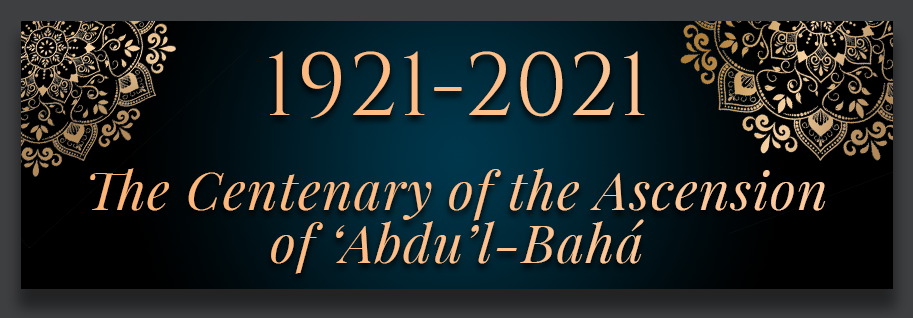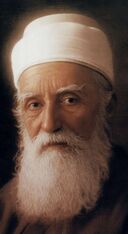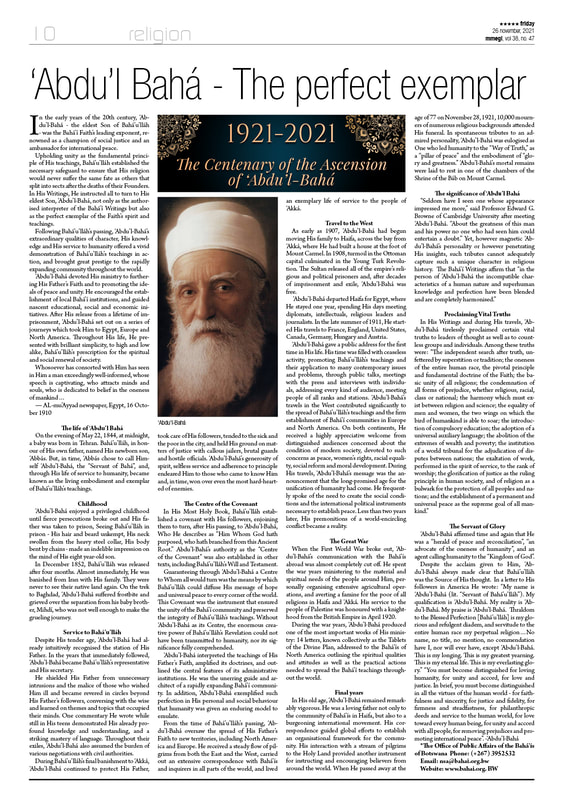|
26/11/2021
‘ABDU’L‑BAHÁ – THE PERFECT EXEMPLAR In the early years of the 20th century, ‘Abdu’l-Bahá—the eldest Son of Bahá’u’lláh—was the Bahá’í Faith’s leading exponent, renowned as a champion of social justice and an ambassador for international peace. Upholding unity as the fundamental principle of His teachings, Bahá’u’lláh established the necessary safeguard to ensure that His religion would never suffer the same fate as others that split into sects after the deaths of their Founders. In His Writings, He instructed all to turn to His eldest Son, ‘Abdu’l-Bahá, not only as the authorized interpreter of the Bahá’í Writings but also as the perfect exemplar of the Faith’s spirit and teachings.  Following Bahá’u’lláh’s passing, ‘Abdu’l-Bahá’s extraordinary qualities of character, His knowledge and His service to humanity offered a vivid demonstration of Bahá’u’lláh’s teachings in action, and brought great prestige to the rapidly expanding community throughout the world. ‘Abdu’l-Bahá devoted His ministry to furthering His Father’s Faith and to promoting the ideals of peace and unity. He encouraged the establishment of local Bahá’í institutions, and guided nascent educational, social and economic initiatives. After His release from a lifetime of imprisonment, ‘Abdu’l-Bahá set out on a series of journeys which took Him to Egypt, Europe and North America. Throughout His life, He presented with brilliant simplicity, to high and low alike, Bahá’u’lláh’s prescription for the spiritual and social renewal of society. Whosoever has consorted with Him has seen in Him a man exceedingly well-informed, Whose speech is captivating, Who attracts minds and souls, Who is dedicated to belief in the oneness of mankind… — AL-MU’AYYAD NEWSPAPER, EGYPT, 16 OCTOBER 1910 The Life of ‘Abdu’l‑Bahá On the evening of 22 May 1844, at midnight, a baby was born in Tehran. Bahá’u’lláh, in honour of His own father, named His newborn son, ‘Abbás. But, in time, ‘Abbás chose to call Himself ‘Abdu’l-Bahá, the “Servant of Bahá”, and, through His life of service to humanity, became known as the living embodiment and exemplar of Bahá’u’lláh’s teachings. Childhood ‘Abdu’l-Bahá enjoyed a privileged childhood until fierce persecutions broke out and His father was taken to prison, Seeing Bahá’u’lláh in prison—His hair and beard unkempt, His neck swollen from the heavy steel collar, His body bent by chains—made an indelible impression on the mind of His eight year-old son. In December 1852, Bahá’u’lláh was released after four months. Almost immediately, He was banished from Iran with His family. They were never to see their native land again. On the trek to Baghdad, ‘Abdu’l-Bahá suffered frostbite and grieved over the separation from his baby brother, Mihdí, who was not well enough to make the grueling journey. Service to Bahá’u’lláh Despite His tender age, ‘Abdu’l-Bahá had already intuitively recognized the station of His Father. In the years that immediately followed, ‘Abdu’l-Bahá became Bahá’u’lláh’s representative and His secretary. He shielded His Father from unnecessary intrusions and the malice of those who wished Him ill and became revered in circles beyond His Father’s followers, conversing with the wise and learned on themes and topics that occupied their minds. One commentary He wrote while still in His teens demonstrated His already profound knowledge and understanding, and a striking mastery of language. Throughout their exiles, ‘Abdu’l-Bahá also assumed the burden of various negotiations with civil authorities. During Bahá’u’lláh’s final banishment to ‘Akká, ‘Abdu’l-Bahá continued to protect His Father, took care of His followers, tended to the sick and the poor in the city, and held His ground on matters of justice with callous jailers, brutal guards and hostile officials. ‘Abdu’l-Bahá’s generosity of spirit, selfless service and adherence to principle endeared Him to those who came to know Him and, in time, won over even the most hard-hearted of enemies. The Centre of the Covenant In His Most Holy Book, Bahá’u’lláh established a covenant with His followers, enjoining them to turn, after His passing, to ‘Abdu’l-Bahá, Who He describes as “Him Whom God hath purposed, Who hath branched from this Ancient Root.” ‘Abdu’l-Bahá’s authority as the “Centre of the Covenant” was also established in other texts, including Bahá’u’lláh’s Will and Testament. Guaranteeing through ‘Abdu’l-Bahá a Centre to Whom all would turn was the means by which Bahá’u’lláh could diffuse His message of hope and universal peace to every corner of the world. This Covenant was the instrument that ensured the unity of the Bahá’í community and preserved the integrity of Bahá’u’lláh’s teachings. Without ‘Abdu’l-Bahá as its Centre, the enormous creative power of Bahá’u’lláh’s Revelation could not have been transmitted to humanity, nor its significance fully comprehended. ‘Abdu’l-Bahá interpreted the teachings of His Father's Faith, amplified its doctrines, and outlined the central features of its administrative institutions. He was the unerring guide and architect of a rapidly expanding Bahá’í community. In addition, ‘Abdu’l-Bahá exemplified such perfection in His personal and social behavior that humanity was given an enduring model to emulate. From the time of Bahá’u’lláh’s passing, ‘Abdu’l-Bahá oversaw the spread of His Father’s Faith to new territories, including North America and Europe. He received a steady flow of pilgrims from both the East and the West, carried out an extensive correspondence with Bahá’ís and inquirers in all parts of the world, and lived an exemplary life of service to the people of ‘Akká. Travel to the West As early as 1907, ‘Abdu’l-Bahá had begun moving His family to Haifa, across the bay from ‘Akká, where He had built a house at the foot of Mount Carmel. In 1908, turmoil in the Ottoman capital culminated in the Young Turk Revolution. The Sultan released all of the empire’s religious and political prisoners and, after decades of imprisonment and exile, ‘Abdu’l-Bahá was free. ‘Abdu’l-Bahá departed Haifa for Egypt, where He stayed one year, spending His days meeting diplomats, intellectuals, religious leaders and journalists. In the late summer of 1911, He started His travels to France, England, United States, Canada, Germany, Hungary and Austria. ‘Abdu’l-Bahá gave a public address for the first time in His life. His time was filled with ceaseless activity, promoting Bahá’u’lláh’s teachings and their application to many contemporary issues and problems, through public talks, meetings with the press and interviews with individuals, addressing every kind of audience, meeting people of all ranks and stations. ‘Abdu’l-Bahá’s travels in the West contributed significantly to the spread of Bahá’u’lláh’s teachings and the firm establishment of Bahá’í communities in Europe and North America. On both continents, He received a highly appreciative welcome from distinguished audiences concerned about the condition of modern society, devoted to such concerns as peace, women’s rights, racial equality, social reform and moral development. During His travels, ‘Abdu’l-Bahá’s message was the announcement that the long-promised age for the unification of humanity had come. He frequently spoke of the need to create the social conditions and the international political instruments necessary to establish peace. Less than two years later, His premonitions of a world-encircling conflict became a reality. The Great War When the First World War broke out, ‘Abdu’l-Bahá’s communication with the Bahá’ís abroad was almost completely cut off. He spent the war years ministering to the material and spiritual needs of the people around Him, personally organizing extensive agricultural operations, and averting a famine for the poor of all religions in Haifa and ‘Akká. His service to the people of Palestine was honoured with a knighthood from the British Empire in April 1920. During the war years, ‘Abdu’l-Bahá produced one of the most important works of His ministry: fourteen letters, known collectively as the Tablets of the Divine Plan, addressed to the Bahá’ís of North America outlining the spiritual qualities and attitudes as well as the practical actions needed to spread the Bahá’í teachings throughout the world. Final years In His old age, ‘Abdu’l-Bahá remained remarkably vigorous. He was a loving father not only to the community of Bahá’ís in Haifa, but to a burgeoning international movement. His correspondence guided global efforts to establish an organizational framework for the community. His interaction with a stream of pilgrims to the Holy Land provided another instrument for instructing and encouraging believers from around the world. When He passed away at the age of 77 on 28 November 1921, His funeral was attended by 10,000 mourners of numerous religious backgrounds. In spontaneous tributes to an admired personality, ‘Abdu’l-Bahá was eulogized as One who led humanity to the “Way of Truth,” as a “pillar of peace” and the embodiment of “glory and greatness.” ‘Abdu’l-Bahá’s mortal remains were laid to rest in one of the chambers of the Shrine of the Báb on Mount Carmel. The Significance of ‘Abdu’l‑Bahá “Seldom have I seen one whose appearance impressed me more,” said Professor Edward G. Browne of Cambridge University after meeting ‘Abdu’l-Bahá. “About the greatness of this man and his power no one who had seen him could entertain a doubt.” Yet, however magnetic ‘Abdu’l-Bahá’s personality or however penetrating His insights, such tributes cannot adequately capture such a unique character in religious history. The Bahá’í Writings affirm that “in the person of ‘Abdu’l-Bahá the incompatible characteristics of a human nature and superhuman knowledge and perfection have been blended and are completely harmonized.” Proclaiming Vital Truths In His Writings and during His travels, ‘Abdu’l-Bahá tirelessly proclaimed certain vital truths to leaders of thought as well as to countless groups and individuals. Among these truths were: “The independent search after truth, unfettered by superstition or tradition; the oneness of the entire human race, the pivotal principle and fundamental doctrine of the Faith; the basic unity of all religions; the condemnation of all forms of prejudice, whether religious, racial, class or national; the harmony which must exist between religion and science; the equality of men and women, the two wings on which the bird of humankind is able to soar; the introduction of compulsory education; the adoption of a universal auxiliary language; the abolition of the extremes of wealth and poverty; the institution of a world tribunal for the adjudication of disputes between nations; the exaltation of work, performed in the spirit of service, to the rank of worship; the glorification of justice as the ruling principle in human society, and of religion as a bulwark for the protection of all peoples and nations; and the establishment of a permanent and universal peace as the supreme goal of all mankind.” The Servant of Glory ‘Abdu’l-Bahá affirmed time and again that He was a “herald of peace and reconciliation”, “an advocate of the oneness of humanity”, and an agent calling humanity to the “Kingdom of God”. Despite the acclaim given to Him, ‘Abdu’l-Bahá always made clear that Bahá’u’lláh was the Source of His thought. In a letter to His followers in America He wrote: “My name is ‘Abdu’l-Bahá (lit. “Servant of Bahá’u’lláh”). My qualification is ‘Abdu’l-Bahá. My reality is ‘Abdu’l-Bahá. My praise is ‘Abdu’l-Bahá. Thraldom to the Blessed Perfection [Bahá’u’lláh] is my glorious and refulgent diadem, and servitude to all the human race my perpetual religion…No name, no title, no mention, no commendation have I, nor will ever have, except ‘Abdu’l-Bahá. This is my longing. This is my greatest yearning. This is my eternal life. This is my everlasting glory.” “You must become distinguished for loving humanity, for unity and accord, for love and justice. In brief, you must become distinguished in all the virtues of the human world—for faithfulness and sincerity, for justice and fidelity, for firmness and steadfastness, for philanthropic deeds and service to the human world, for love toward every human being, for unity and accord with all people, for removing prejudices and promoting international peace”. -‘Abdu’l-Bahá
|
Bahá’ís of BotswanaBahá’í communities are working together with their neighbours and friends to promote and contribute to the well-being and progress of society. In urban centres and rural villages, in homes and schools, citizens of all backgrounds, classes and ages are participating in a dynamic pattern of life, taking part in activities which are, at once, spiritual, social and educational. Archives
January 2023
Categories |
||||||
FOR MORE INFORMATION
|
|

 RSS Feed
RSS Feed